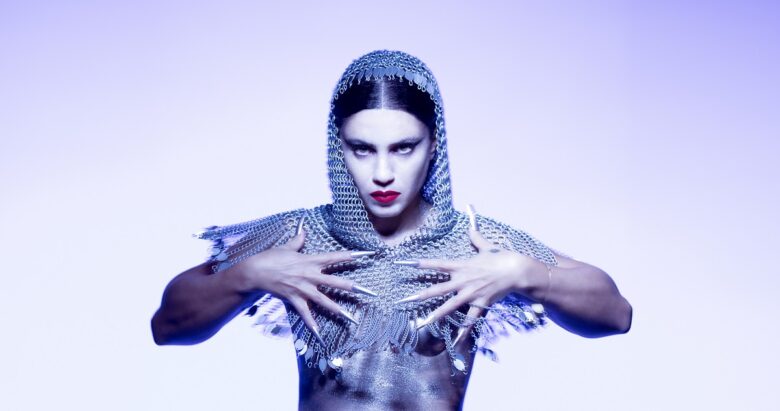Photo Credit: Amber Grey
On “Nar (Ft. Ami Yerewolo)”
Unprecedented 100% Woman-Made Album MRA Out April 19
Featuring An All-Female + Queer Team of Collaborators
Including Camélia Jordana, Alyona Alyona, Nayomi,
Penelope Antena and More
Today, Tunisian/American, New York City-based art pop musician EMEL (Emel Mathlouthi) has shared “Nar” featuring Mali’s first female Mandinka rapper Ami Yerewolo. It’s the latest preview of her groundbreaking upcoming LP MRA, out April 19 via her own Little Human label. MRA is at turns both a call for compassion and to action, as much about EMEL using her voice as it is a rallying cry for her fellow women to do so freely. Released on International Women’s Day, “Nar” (meaning ‘fire’ in Arabic) is no exception. “It’s about taking back control of our lives, our narrative, our color, our speech. We are building an army to reclaim women’s voices,” EMEL says.
The single and its accompanying video — directed by Inès Saidi, produced by Deena Abderrahim of Film DNA, and filmed on location at an old, women-operated textile factory in Cairo, Egypt and a village in the outskirts of Bamako, Mali — both speak to female revolutionary power. Saidi explains, “This power is not only embodied in the music video by the strength of the women depicted, but also by an unprecedented collaboration of African women, one from Tunisia, the other from Mali. The decision to shoot the video in Africa stems from a desire to reclaim Africanness while moving away from the exoticism to which African cultures are generally confined.”
Watch / Listen: “Nar (Ft. Ami Yerewolo)”

“Nar” Single Art
A multi-genre and multilingual meld where African trap, batucada, Arabic reggaeton, hip hop, and drum n’ bass rub shoulders seamlessly with vibrant melodies and empowering lyrics, MRA (meaning ‘woman’ in Arabic) seeks to amplify and strengthen the voices of women worldwide, specifically in a largely male driven music industry. That is why every single collaborator on MRA, from producers, featured artists, musicians, technicians, photographers and beyond, is a woman — marginalized in recognition, but outsized in talent. With “Nar,” EMEL shines her spotlight on Ami Yerewolo, a pioneering rapper in her own right, who in 2014 released the first female Malian rap album Naissance (‘Birth’).
Having worked alongside such formidable visionaries as Iranian filmmaker Shirin Neshat, and multimedia artist Laurie Anderson, EMEL knows the mutually beneficial strength forged by working with women, sharing a platform and trusting one another. “I’ve come to discover the true meaning of sisterhood. I’m not interested in the inherited feeling that other women are my rivals anymore,” she says. “I want us to change the system from within by and through women. We are building a new structure, writing a new story where we reclaim the women’s voice and her power. As an Arab woman from Africa I was never allowed to define myself in my own terms, I was often stripped from the multiple layers that composed me and my music. For the west, I had only two ways of existing: exotic or political.”
EMEL’s career is punctuated with eclectic collaborations with iconic artists like Alaïa and Jean-Paul Gaultier on her stage wardrobe and scoring work with Shirin Neshat, Robert Del Naja, and more recently on Assassin’s Creed: Mirage. In 2010, she was named the voice of the Arab Spring when her folk-hymnal “Kelmti Horra (My Word Is Free),” once banned, was resurrected as a protest anthem. She’d later perform the track at the Nobel Peace Prize ceremony and concert in Oslo. Two years later, amongst touring all over Europe and the US, EMEL furtively played an underground concert in volatile Baghdad, Iraq, and a highly illegal, all-women performance in Iran, as chronicled in the documentary No Land’s Song. And last summer, she performed for Palestinians — the subject of her track “Naci En Palestina (I Was Born in Palestine)”— in East Jerusalem and the West Bank facing backlash.
“I don’t create things to be consumed,” she says. “I hope it transcends time, transcends boundaries, transcends cultures. Music can change the world.”

MRA Album Art
Follow EMEL:
Instagram | Spotify | Website | Facebook | Twitter | Tik Tok



